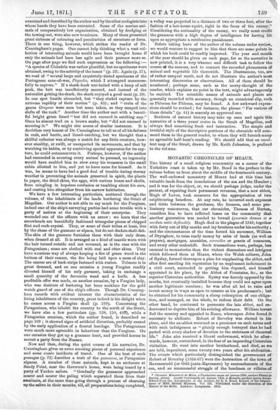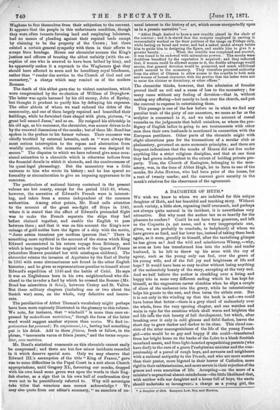MONASTIC CHRONICLES OF MEAUX.
THE history of a small religious community on a corner of the- Yorkshire coast is taken up by Mr. Bond in the preface to the volume before us from about the middle of the fourteenth century. The well-endowed monastery of Meaux had at this time lost valuable lands from the inundations of the sea and the Humber ; and it was for the object, or, we should perhaps judge, under the pretext, of repairing their permanent revenues, that a new abbot, Hugh of Leven, took measures for the appropriation of two neighbouring benefices. At any rate, he incurred such expenses- and debts between the purchases, the licences, and some pre- liminary manceuvres, that our chronicler, Thomas of Burton, considers him to have inflicted losses on the community that another generation was needed to bewail (enormia damna et ce necdunz natis defienda). Hugh died in the plague of 1349, together with forty out of fifty monks and lay brethren under his authority ; and the circumstances of the time forced his successor, William of Drynghow, to raise ready money by sales of lands (as well so prayers), mortgages, annuities, corrodies or grants of commons, and every other makeshift. Such transactions were, perhaps, less unusual in monasteries than the violent dissensions and intrigues. which followed them at Meaux, where the Welsh cellarer, John of Ryslay, formed thereupon a plan for supplanting the abbot, and after first assailing his reputation by an unpleasant indictment in a civil court, succeeded in getting him deposed, and himself appointed in his place, by the Abbot of Fountains, &c., as the superior Cistercian authorities. Ryslay was fiercely opposed by the monks, but eventually installed because they could not agree upon another legitimate nominee ; he was after all led to raise and invest money in ways as open to censure as his predecessor's ; but he obtained for his community a cheap redemption of one obliga- tion, and managed, on the whole, to reduce their debt. On the other hand, he continued to persecute the late abbot, and en- deavoured to deprive him of his retiring allowance. William hereat fled the country and appealed to Rome, whereupon John found it necessary to abdicate. Robert of Beverley was elected in his place, and the ex-abbot returned as a pensioner on such terms and with such indulgences as "plainly enough betrayed that he had parted with every shadow of devotion to the strictness of claustral life." John also received a liberal endowment, which he after- wards, however, surrendered, in the fear of an impending Cistercian visitation. He went into another brotherhood, and died, as we arc told, impenitent, some twenty-two years after his abdication. The events which particularly distinguished the government of Robert of Beverley (1356-67) were the destruction of the town of Ravenserodd (or Odd-juxta-Revensere) by encroachments of the sea, and an unsuccessful struggle of the bondmen or villeins of • Chroniea Monasterii de rifelsa, a Fundatione usque ad Annum 1396, austere Tharnd do Burton, Abbate. Aecedit Continuatio ad Annum 1406, a MonarAo quodarn fpsitts &ands. Edited from the Autographs of the Author, by E. A. Bond, Koeper of the Depart- ment of MSS. British Museum. Vol. III. Published under the direction of the Master of the Rolls. London: Longmans. 1868.
Waghene to free themselves from their subjection to the convent. It appears that the people in this unfortunate condition, though they were often tenants farming land and employing labourers, lad no means of pleading against their reputed lords except by claiming to be the property of the Crown ; but there existed a certain general sympathy with them in their efforts to escape from bondage. Hence our chronicler accuses the King's justices and officers of treating the abbot unfairly (with the ex- ception of one who is avowed to have been bribed by him), and he apparently makes it a reproach to the Wagheners that they should have affected to seem and be hereditary royal bondsmen, rather than "render due service to the Church of God and our monastery," a charge which may remind us of the modern 'Romans.
The death of this abbot gave rise to violent contentions, which were compromised by the re-election of William of Drynghow.
The latter was again harassed by his old enemy, John of Ryslay, but thought it prudent to pacify him by defraying his expenses. The other abbots of whom we read reduced the debts of the community, and one of them largely repaired and beautified their buildings, while he furnished their chapel with plate, pictures, "a great bell named Jesus," and so on. He resigned his abbotship in his old age, as his successor, the chronicler, was sooner driven to do by the renewed dissensions of the monks ; but of them Mr. Bond has spoken in the preface to his former volume. Their successor was chiefly troubled by external lawsuits, such as " were always the most serious interruption to the repose and abstraction from worldly matters, which the monastic system was designed to secure." The disputes to which we have referred give some occa- sional animation to a chronicle which is otherwise tedious from the financial details in which it abounds, and the cumbrousness of its quasi-legal phraseology. But the monastery was a little universe to him who wrote its history ; and he has spared no formality or circumlocution to give an imposing appearance to its concerns.
The particulars of national history contained in the present volume are but scanty, except for the period 1342-49, where, however, the narrative of Edward's French wars is interest- ing, and taken from a source independent of the common authorities. Among other points, Mr. Bond calls attention to the account of the great sea-fight off Sluys in 1340, where it is stated that the effect of Edward's pretended flight was to make the French separate the ships they had before chained together, and enable the English to pass between them ; and that it was on this account the King's new coinage of gold nobles bore the figure of a ship with the motto, "Jesus autem transiens per medium ipsorum ibat." There is something more mythical in the account of the storm which King Edward encountered in his return voyage from Brittany, and which is here imputed to the magical arts of the Queen of France (wherefore Heaven punished her with misshapen children). The chronicler relates the invasion of Aquitaine by the Earl of Derby in 1315 with some circumstances not found in the other English histories ; and he gives us representations peculiar to himself about Edward's expedition of 1346 and the battle of Creel. He says it was an Englishman born in his own neighbourhood who dis- closed to the invader a ford by which he crossed the Somme (Mr. Bond has miswritten it Seine), between Crotoy and St. Valere. Ilut these military chapters (including one or two about the scotch war) seem, on the whole, very defective and inaccu- rate.
The peculiarities of Abbot Thomas's vocabulary might perhaps have been more copiously illustrated in the glossary to this volume. We note, for instance, that " windmill" is more than once ex- pressed by molendinum yentricium," though the form of the latter word would suggest another etymon than yentas. We find im- yotionatum for poisoned; Fr. enzpoisonne', i.e., having had something put in his drink. Add to these friscus, fresh or fallow, in the phrase, " tenementa vacua et frisca jacere," and the terms magna- liter, oves matrices.
Mr. Bond's statistical comments on this chronicle cannot easily be compressed ; and there are but few minor incidents recorded in it which deserve special note. Only we may observe that Edward Ill.'s assumption of the title "King of France," gave -rise to some difficulties in the Papal Court in a suit about Church appropriations, until Gregory XL, favouring our monks, dropped with his own hand some green wax upon the words in their Eng- lish charter, as a sign that in his own bull of confirmation they were not to be punctiliously referred to. Why will sovereigns -take titles that veracious men cannot acknowledge ? We may also quote from our editor's summary, "an anecdote of un-
usual interest in the history of art, which comes unexpectedly upon us in a prosaic narrative ":-
"Abbot Hugh desired to have a new crucifix placed in the choir of the convent ; and it is stated that the sculptor employed in carving it reverentially worked on the finer portions of the image on Fridays only, while fasting on bread and water, and had a naked model always before him to guide him in designing the figure, and enable him to give it a greater beauty When the crucifix was completed and eroded, it was found to be endowed with miraculous powers. - The monks were doubtless benefited by the reputation it acquired; and they reflected that, if women could be allowed access to it, the double advantage would accrue, that general devotion would be promoted, and much additional profit secured to the monastery. They therefore procured authority from the abbot of Oiteaux to allow access to the crucifix to both men and women of honest character, with the proviso that the latter were not to enter the cloister or dormitory, or other offices."
The chronicler thinks, however, that the admission of females proved itself an evil and a cause of loss to the monastery ; for many came without any feeling of devotion—that is, without making any offering—but merely to look over the church, and put the convent to expense in entertaining them.
This passage is one of the few before us in which we find any peculiar trait of the piety of our ancestors, we mean so far as the sculptor is concerned in it, and we take no account of casual remarks on the judgments that befell outsiders, as where the pro- fligacy of English ladies in going to see tournaments with other men than their own husbands is mentioned in connection with the European pestilence. Other parts of the chronicle might with slight alterations pass for the transactions of a secular club or phalanstery, governed on mere economic principles ; and there are frequent indications that the monks of Meaux did not live under anything like a strict religious discipline, and that at one time they had grown independent to the extent of holding private pro- perty. Thus, the Church of Easington, belonging to the mon- astery, was, in the time of Abbot Hugh, let to farm to one of the monks, Sir John Newton, who had been prior of the house, for a rent of twenty marks ; and the convent gave security to the monk's relatives for the observance of the agreement.



































 Previous page
Previous page